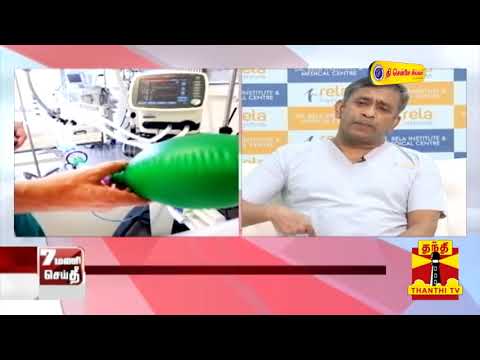LUNG TRANSPLANTATION
Over the past 35 years, lung transplantation has become a viable treatment option for patients with a variety of end-stage lung diseases.
At Rela Hospital, we are dedicated to managing advanced lung diseases. We offer patients and their families effective treatment options and provide excellent care through every stage of the lung transplant process. We are one of the most sought-after lung transplantation hospital in Chennai, and our teams of pre- and post-transplant experts collaborate closely to make patient experience as comfortable as possible.
Our patients spend the shortest amount of time on the lung waitlist and go home sooner after transplant surgery than any other patients undergoing lung transplant in Chennai.
People who have one of the following conditions may be candidates for a lung transplant:
- interstitial lung diseases such as idiopathic pulmonary fibrosis, sarcoidosis, hypersensitivity pneumonitis, pulmonary manifestations of collagen vascular disease, eosinophilic granuloma, and lymphangiomyomatosis (LAM)
- pulmonary vascular disorders, such as primary pulmonary hypertension
- obstructive lung diseases, such as chronic obstructive pulmonary disease (COPD), emphysema, and alpha 1 antitrypsin deficiency
- bronchiectasis, including cystic fibrosis
- other rare conditions that affect the lungs
Once the doctor conducts evaluation and finds that the patient requires lung transplant, the patient is added to the waiting list. The patient now must wait for a suitable donor.
PROCEDURE DETAILS
Once the patient has received the call, arrived at the hospital, gone through the pre-operative workup and the donor lungs have been established as being suitable for transplant, the patient is moved to the operating room. There, patient undergoes general anesthesia (be put to sleep) and will be placed on a ventilator and bypass machine in order to deliver oxygen to the blood while the transplant is taking place.
Four different types of lung transplants are available to patients:
- For a single-lung transplant, an incision is made below the shoulder blade and along the side of the chest. The surgeon removes the old lung and sews the new lung in place, connecting the blood vessels to and from the lung and the main airway. At the end of the operation, the surgeon brings the ribs back together and closes the incision.
- For a double-lung transplant, an incision is made across the middle of the chest, under the breasts, from one underarm to the other. The surgeon partially divides the breastbone and enters the chest cavity between the ribs. The surgeon removes the lung on one side and sews the new lung in place, and then does the same on the opposite side. At the end of the operation, the surgeon wires the breastbone together, brings the ribs back in place, and closes the incision.
- For a heart-lung transplant, an incision is made down the middle of the chest. The surgeon removes the old heart and lungs, leaving a “cuff” of the atrium and the end of the main airway to provide a place to attach the new organs. The surgeon also sews the aorta (the main blood vessel leading to the body) to the aorta of the donor heart. At the end of the operation, the surgeon wires the breastbone together and closes the incision.
- For a lobar transplant from living donors, three operations must be performed simultaneously. In two operations, doctors remove the lower lobes of the lungs from the two donors. The third operation typically involves removing
Most patients wake up two to 10 hours after their surgery is finished. When the patient wakes up in the intensive care unit (ICU), they will a scar that looks like a “zipper” on the chest. The location of this new scar depends on the type of transplant a patient had; it might be down the center of the chest, across the chest just under the breasts or off to one side.
RECOVERY & OUTLOOK
After the surgery, the patient is taken to the surgical intensive care unit where they are watched closely and slowly permitted to wake up from anesthesia. Patients may receive sedation to slow this process if the lungs are having issues that need to be addressed.
After lung transplant, patients need to take immunosuppressant medications for life to prevent rejection. The treatment team will explain medications and potential side effects, including increased susceptibility to infections. They will help manage immunosuppressant medications based on how they are affecting the patients and any signs of rejection.
Follow-up visits to the transplant center will initially be frequent after surgery, and become less frequent as time passes. The risk of rejection is highest in the first few months after surgery.
LIFE AFTER TRANSPLANTION
The first year after a lung transplant is the most critical. This is when serious complications, such as organ rejection and infection, are most common.
While survival rates depend on many factors, such as the medical reason for the transplant, age, and general health, the survival rates are positive.
Two important steps to take are throughout life after surgery are:
- Diet and Nutrition: Healthy eating may be even more important after transplant than it was before the surgery. A dietitian on the transplant team will tailor a program to help eat the right foods as patient recover and move forward. Diet and nutrition should be taken care of in order to prevent future problems.
- Exercise: Getting regular physical activity is important after a lung transplant to maintain a healthy weight and overall good health.
- Infection: Patients, if they are taking immunosuppressants, must be careful of their health and stay safe to prevent getting infected. Even a minor cold may prove fatal when they are immunocompromised.
WHY Rela Hospital
Rela Hospital has high rates of success in lung transplantation in India. Rela Hospital care includes experienced surgeons, doctors and staff who have high level of expertise in lung transplants. Rela Hospital patients range in age and have almost every type of severe heart condition. We are experts with expertise!





